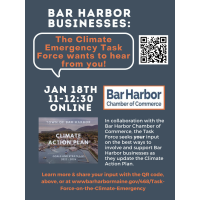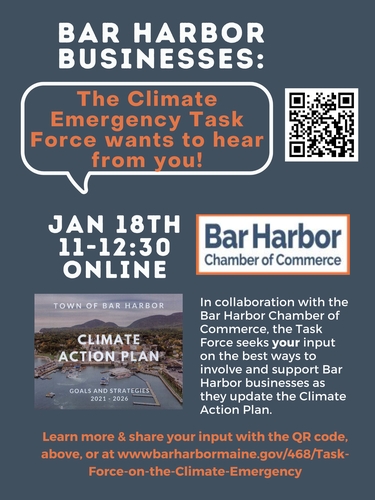-
.png)

Climate Emergency Task Force Business Listening Session
Date and Time
Thursday Jan 18, 2024
11:00 AM - 12:30 PM ESTThursday, January 18th from 11am to 12:30pm
Location
Virtual through Zoom - register for Zoom information to join
https://www.visitbarharbor.com/events/details/climate-emergency-task-force-business-listening-session-47252
Fees/Admission
This event is free to attend
Contact Information
Ezra Sassaman, Climate Emergency Task Force Member
Send EmailDescription
The Bar Harbor Climate Emergency Task Force is currently working on updating its Climate Action Plan (CAP). This plan contains several strategies for climate mitigation and adaptation, but the task force felt Strategies 5 and 6 are the most relevant to the upcoming discussion.
In January 2024, the Bar Harbor Climate Emergency Task Force is hosting a listening session to learn more from businesses about the best strategies to achieve Bar Harbor's climate goals.Strategy 5: Resource Consumption and Waste
Goals
-
Achieve a 75% residential and commercial waste diversion rate by 2026.
-
Achieve a 50% construction and municipal waste diversion rate by 2026.
-
Minimize all community-wide waste to the greatest extent possible by 2030.
-
Support the establishment of sustainable local food production and diversion systems across Mount Desert Island by doing some or all of the following:
-
A community cannery where people could bring their own produce and learn how to process things safely
-
A community freezer for people that would like to raise animals, vegetables or fruit and don't have the room to freeze much food in their home.
-
A slaughterhouse to encourage livestock production
-
Removal of code barriers to having a commercial kitchen in a residential area, having employees living on the farm, and/or having restrictions to offering take out meals in a residential area
-
Actions
Community-wide
-
Encourage and promote sustainable resource use practices in accordance with the Maine State Hierarchy of Waste.
-
Publicize state and local restrictions on plastic bags and single-use containers.
-
Conduct annual comprehensive community-wide waste audits in order to identify seasons with greatest impact, track progress, and implement strategies to minimize discarded resources.
-
Investigate and establish as appropriate the systems, policies, and infrastructure necessary to minimize discarded resources and support sustainable materials management across Bar Harbor, such as:
-
A “save-as-you-throw” system for commercial and/or residential waste
-
Improvements to current single-stream resource recycling systems, such as implementing a new method of diverting glass.
-
Mandatory recycling requirements for commercial and multi-family residential buildings (with recognition of compliant businesses). Encourage businesses that produce a significant amount of food waste to divert this waste (e.g., Too Good To Go).
-
Community food waste composting, including creation of community compost piles and restore municipal provision of household compost bins to Bar Harbor residents through the Maine Resource Recovery Association (MRRA).
-
Enabling resources (e.g., compost facilities and food waste haulers, e.g., “garbage to gardens”) needed prior to establishing a municipal or island-wide food waste ban.
-
Establishment of a municipal (or island-wide) food waste ban by 2030.
-
Facilitation of a community-wide culture of reuse and repair, including through hosting regular community swap and item repair workshops.
-
Strategy 6: Sustainable Local Economy
Goals
-
Establish Bar Harbor as a leading green tourism destination by 2030.
-
Promote climate action as a key component of a sustainable, year-round local economy in Bar Harbor.
Actions
-
Actively support the development and adoption of voluntary climate action and sustainability programs and initiatives by local Bar Harbor businesses.
-
Collaborate with the Bar Harbor Chamber of Commerce, A Climate To Thrive, and other community groups to promote local businesses that are actively working towards sustainability and climate action through their operations.
-
-
Build the capacity of local Bar Harbor businesses to take climate action and respond to projected climate impacts.
-
Provide local business owners with educational resources about existing local, state, and national programs and incentives to support greenhouse gas emissions reductions in businesses, such as building energy audits and efficiency upgrades.
-
Support business to business (b to b) collaboration and networking to share carbon reduction ideas and work.
-
Explore ways the town might support a circular, local economy. For example farm to restaurant to farm
-
Encourage businesses to adopt high gain decarbonization changes such as building efficiency and solar power.
-
Provide efficiency and decarbonization training for local employees.
-
Celebrate and recognize business efforts to decarbonize.
-
Understand commercial waste and its impact on town greenhouse gas emissions.
-
Support the establishment of a multi-stakeholder Sustainable Tourism and Business advisory group to investigate the environmental impacts of tourism in Bar Harbor, identify climate risks to local businesses, develop strategies for sustainable tourism, and provide direct support to local business owners seeking to take climate action.

-
Tell a Friend
-
-
 Plan Your Experience
Plan Your Experience- Stay
- See & Do
- Eat & Drink
- Know Before You Go
- Gatherings
- Experiences
-
It all starts with a visit...



